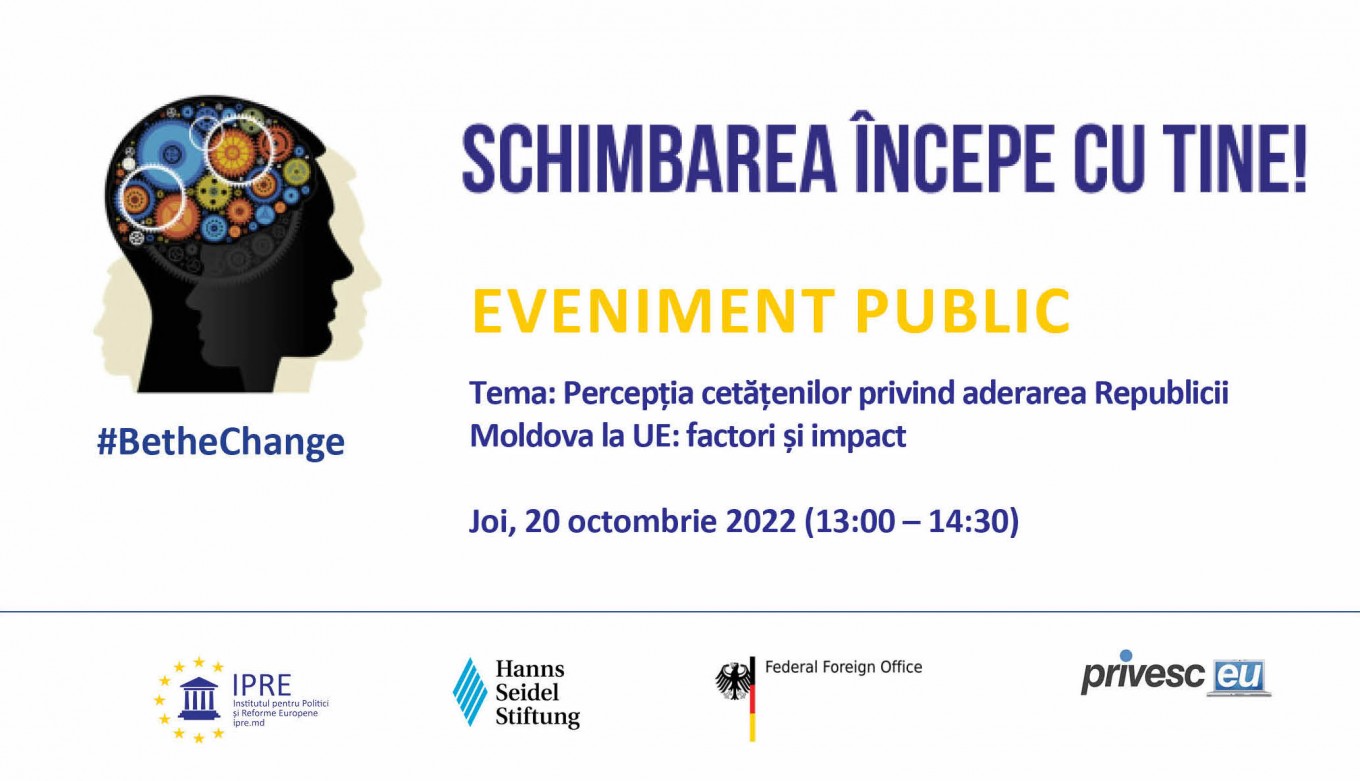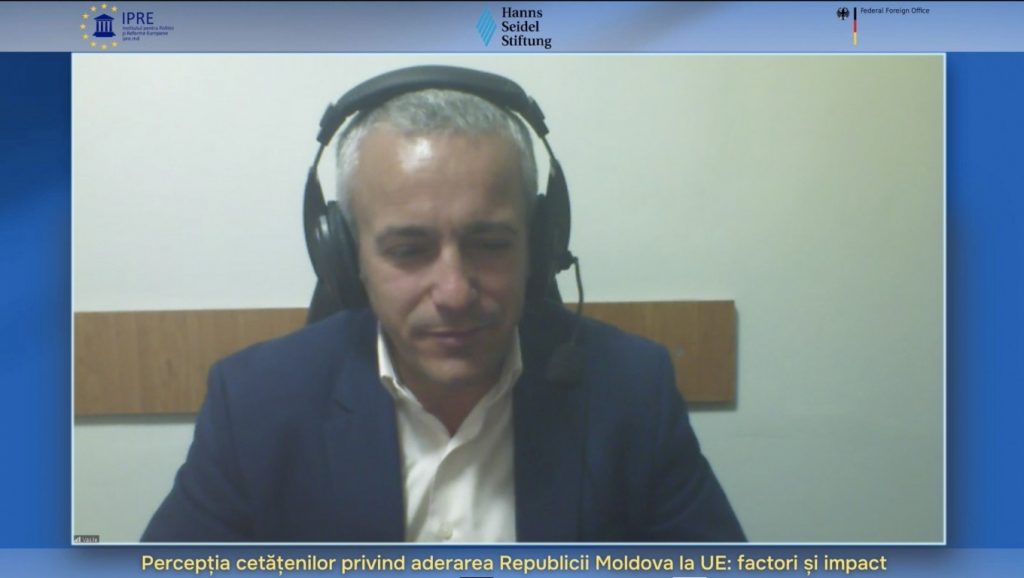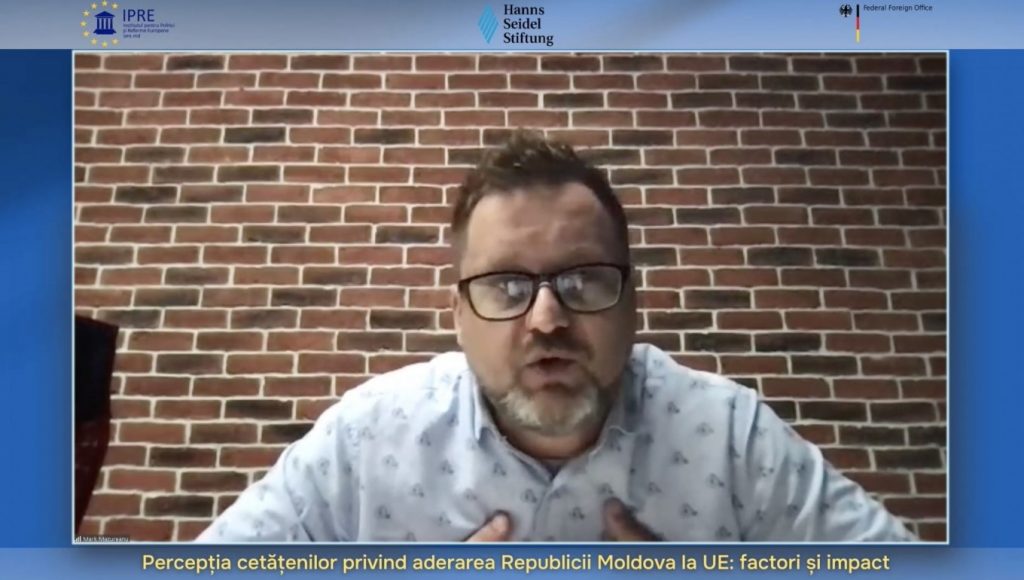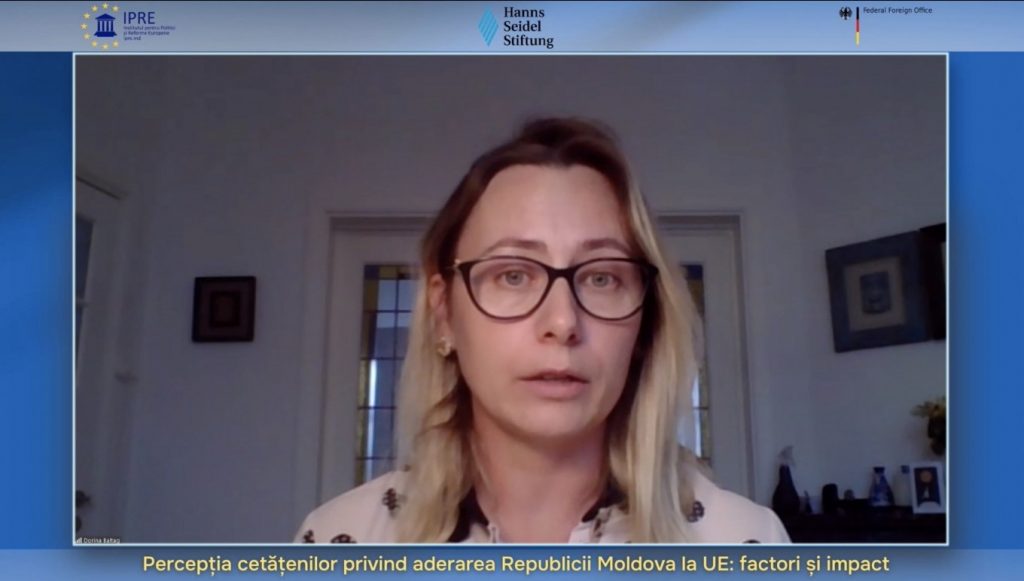Public event #BeTheChange: Citizens’ perception regarding Moldova’s accession to the EU: factors and impact

The Institute for European Policies and Reforms (IPRE), with the support offered by the Hanns Seidel Foundation in the Republic of Moldova and partnership with Privesc.eu, organized on Thursday, 20th October 2022, the fourth event of this year within the initiative “#BeTheChange: The change starts with you!”, dedicated to the subject of citizens’ perception of the Republic of Moldova’s accession to the EU.
The guest speakers of the event, which was moderated by Cristina Rotari, an intern of the #BetheChange program within IPRE, discussed about the citizens’ perception of EU accession and the developments recorded in recent years, as well as the information and disinformation tools which influence public opinion on the EU accession process, but also on the factors that influence citizens’ perception on that matter.
Next, we put forward some of the main interventions of the speakers.

Vasile Cantarjî, Sociologist, CBS-AXA: “I will mostly refer to the Public Opinion Barometer. The descriptive analysis shows us that, in general, over time, we have co-occurrences with the internal political developments in the country. The indicator does not fluctuate much in regard to any major events directly linked to the integration process. In the period of 2009-2022, we had at least two major events: the liberalization of the visa regime and the granting of candidate country status. The latter does not present any immediate and palpable benefit to the average citizen, and that would explain why there is a lack of reaction. Also, we see that neither the granting of the liberalized visa regime was followed by any important increase of European Integration support and I really cannot come up with a complex answer to why not. Perhaps, the liberalized visa regime did not cause an immediate reaction in public opinion, because, in the meantime, everyone interested in traveling and other matters, found other means to achieve that. The second factor would undoubtedly be the linguistic one. Thus, it is worth noticing that in 2003, a potential referendum would bring a majority pro-EU vote, including among the Russian, Ukrainian, Bulgarian, and Gagauz ethnic minorities. Practically all ethnic groups in Moldova endorsed European Integration. In 2021, for various reasons, the approval decreased in the majority group, but it decreased much more in the case of ethnic minorities. Another factor for the level of approval is the perception of Russia as an alternative to European integration and the information war that Russia is waging. The greater the trust in Vladimir Putin, the lower the approval for European Integration”.

Mark Mazureanu, Executive Director of ASIST, Expert in the field of comparative politics and international relations: “We see that when we talk about the perception of citizens we have factors that influence the process that are not very changeable over time, such as age, education, social status or gender. For instance, in regard to social status, vulnerability makes a person opt for short-term solutions. A person standing on the poverty line will vote for the salami today and not the tomorrow’s integration. The higher the rate of the middle and upper class in our society will be, the more we will shift priorities toward long-term benefits. We have some other important factors, such as the quality of the discourse, its creators, coherence and the ability to spread it. Even if the pro-Western message is much more coherent and well-argued, at the level of spreading capacity, the Russian camp wins a lot and therefore public opinion does not change much. What makes an individual prioritize one civilization or value system over another? I think the trust and attractiveness of the system. The system offers the safety and trust of today and tomorrow, which resonates over time and all this creates an attractiveness conveyed in a coherent language that people can swallow and accept”.

Dorina Baltag, PhD, Researcher in EU foreign policy and diplomacy, Institute for Diplomacy and International Governance in London: “In the language of European studies, discussions are held on the benefit of the liberalized visa regime, and here it is also taken into account that we are talking about perceptions. Perception is a subjective factor, even if your level of education is high, even if the economic factor is stable, with the first base of Maslow’s hierarchy of needs being stable, it matters how a person’s perception changes, no matter where they are: in Great Britain or Moldova. It is important to be informed, to ask questions, and when we have data, to put it in context. Context matters a lot. The language matters, as well as how the data is interpreted and then how it is told through the media channels to the wider population. We will notice that in all countries, when the language is sophisticated, you create a very large dissonance between ordinary citizens, no matter how educated they are. When we talk about perception, it also matters how prepared the institutions are. During a visit to Moldova, I did several interviews, including at some ministries and the presidency and the answer was that a problem was the lack of the middle-management. The second element is the middle class. At the civil society level, the Republic of Moldova is advanced. There are think-tanks, action-tanks, NGOs and initiative groups, but we also have a critical mass of people. Thus, citizens’ involvement in organizations and interest groups, but also access to advocacy and lobbying channels, are very important. Not that it necessarily has a direct correlation, but indirectly, it makes the citizens responsible for certain democratic processes that take place in the country, such as the process of joining the European Union”.
For more details, you can watch the video recording of the event on privesc.eu here.
The event was organized by the interns participating in the #IPREInternship2022 program, part of the project “The change starts with you! – #BetheChange: young people for the Europeanization of the Republic of Moldova”, implemented in partnership with the Hanns Seidel Foundation in the Republic of Moldova and with the financial support of the Federal Ministry of Foreign Affairs of Germany.

